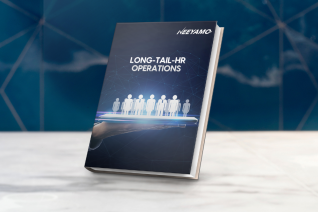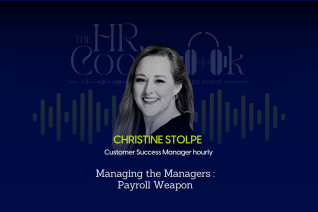Establish your presence globally with Neeyamo as we help you go beyond borders to manage your global payroll and hire new talent in France.
Overview
France is the global epicenter for tourism. An impressive 79.4 million visitors graced the country's scenic landscapes in 2022, propelling France to the coveted title of the world's most popular tourist destination. This accolade extends to France's renowned cultural gem, The Louvre, which is the most frequented art museum globally. However, France's appeal goes beyond tourism. Owing to its highly proficient and committed workforce, the country has emerged as the preferred destination for those seeking to recruit top talent.
Do your organization’s expansion plans require you to hire employees in France? Do you lack a physical entity in the country – a key requisite to hiring local talent? Neeyamo assists organizations worldwide with onboarding and managing employees in France - processing payroll, managing local compliance requirements, benefits, and more.
Our Presence
Tools And Instances
Facts And Stats
Capital
Paris
Currency
Euro(EUR)
Official Language
French
Fiscal Year
1 January- 31 December
Date Format
DD/MM/YYYY
Country Calling Code
+33
Other Languages
Occitan, German and German dialects
Time Zone
Central European Standard Time (UTC+1)
Global Payroll
Overview
Handling payroll for a widespread workforce can pose a significant challenge for any organization, and the added complication of compliance can make things worse. If companies spend more time processing payroll, it directly impacts day-to-day operations and their overall productivity.
What is global payroll?
Over the years, Neeyamo has observed these complexities and strived to provide global payroll solutions through a single technology platform - Neeyamo Payroll. Neeyamo's global payroll services ease the process for companies looking to outsource their global payroll requirements and aid them in maneuvering the tricky payroll system in France.
How to calculate payroll?
Neeyamo acts as your personalized Payroll Calculator. Ensuring adherence to local regulatory requirements using multi-level controls. Providing timely and accurate payroll, courtesy of our experts worldwide and using a tech-based integrated smart helpdesk solution with seamless support experience manned by payroll experts - Neeyamo has all your payroll needs covered.
Payroll Taxes
How to calculate tax for payroll?
Payroll tax is the percentage amount retained from an employee's salary and paid to the government to invest in the general population's welfare. These are statutory in nature and are levied from both the employer and employee. Additional statutory contributions are made by employers towards aiding both short-term and long-term benefits for their employees.
Employee Taxes
- 6.90% - Old Age Insurance (ceiling of 3,864 EUR)
- 0.4% - Old-age insurance
- 9.20% - Social Security Surcharge
- 0.5% - Social Security debt reimbursement contribution (Contribution pour le remboursement de la dette sociale/ CRDS)
- 0.0024% - APEC
- 0.14 % - General Technical Balance
- 17% - Total Employee Cost
The income tax bracket is as follows:
| Income (in EUR) | Tax % |
| Up to €11,294 | 0% |
| From €11,295 to €28,797 | 11% |
| From €28,798 to €82,341 | 30% |
| From €82,342 to €177,106 | 41% |
| More than €177,106 | 45% |
Employer Taxes
- 7% - Health, Maternity, Disability, Death *for employees earning up to 2.5 times the minimum wage as of December 31, 2023. The contribution rate remains at 13% for other cases, and an additional 6% health contribution must be declared under CTP 635.
- 0.30% - Autonomy Solidarity Contribution
- 8.55% - Old Age Insurance (ceiling of 3,864 EUR)
- 3.45% or 5.25% - Family Benefits (3.45% contribution rate for "family allowances" for employees earning up to 3.5 times the minimum wage as of December 31, 2023. For other cases, the family allowance contribution rate remains at 5.25%)
- 4.05% - Unemployment (ceiling of 14, 664 EUR)
- 0.20% - AGS (Wage Guarantee Insurance)
- 2.02% - Old-age insurance
- 0.0036% - APEC
- 29.50% - 31.30% - Total Employment Cost
Payroll Cycle
Overview
Undoubtedly, payroll is a critical process for any organization. Pay cycle in France refers to the period for which an organization pays its employees, and this can vary depending on the pay frequency that the organization chooses to adopt.
Frequency
The payroll cycle in France is monthly. While there is no fixed date when salaries must be paid, it is common to pay employees at the end of the month. It is also possible to have a pay date outlined in a collective labor agreement.
13th Month Cycle
The 13th and 14th month payments are not legally required in France, but they are commonly provided to employees by their employers. The 13th month payment is typically paid out in December, and the 14th month payment is typically paid out in June.
Global Work
Overview
What is Employer of Record?
An Employer of Record (EOR) service provider helps you eliminate the hassle of handling complexities while onboarding a new employee in an international location. They help bridge the gap that otherwise mandates organizations to have a local registered entity and a local bank account, prior to making a job offer to an international hire.
An EOR service provider acts as a legal employer, facilitates salary payments, and manages other statutory requirements such as health insurance, payroll taxes, and employee benefits ensuring compliance with local tax laws and regulations.
This allows organizations to focus on collaborating with the employees in France for operational tasks, with the knowledge that they have a cost-effective solution like Neeyamo to provide the best employer of record services, payroll services, and HR requirements as they continue their global expansion,
HR Mandates and Practices
Minimum wage
As of November 1, 2024, France's minimum wage (SMIC) is €11.88 per hour, equating to a gross monthly salary of approximately €1,802.26 for a 35-hour workweek.
Overtime
In France, work done beyond the weekly 35 hours falls under the category of over time work. With an established agreement, overtime pay must be no less than 110% of the regular wages.
If no agreement is in place, overtime pay is 125% of the regular pay for the first 8 hours of overtime and 150% for every hour after.
Flat-rate Assessment Scales for Specific Employer Benefits in Kind
Effective from April 6, 2023
- Flat-rate scales for meal benefits provided to various types of employees for 2022 and 2023.
- Flat-rate scales for housing benefits, based on the monthly social security ceiling and the number of rooms in employer-provided accommodation, for 2022 and 2023.
- The extended application, through Dec. 31, 2024, of the valuation method for employer-provided electric vehicles for purposes of calculating social security contributions.
- The valuation method for employer-provided electric vehicle charging stations for purposes of calculating social security contributions between January 1, 2023, and Dec. 31, 2024.
Data Retention Policy
All documents depend on their type, and it can vary from one year to 30 years. The time frame to store the documents is listed below.•
- The relevant inspection authorities can ask to see any of the documents within the time limit. Documents related to tax, such as income tax, business taxes, local taxes, VAT, etc., have to be stored for six years.
- Employees’ contracts and documents concerning their salaries, bonuses, and retirement schemes must be kept for five years. So must all commercial contracts and correspondence, banking including cheque stubs and statements, and transport documents.
Hiring and Onboarding Requirements
Hiring
Hiring employees in France can be difficult because litigation and collective bargaining agreements are common. The best way to employ and onboard a new worker is through a strong, written employment contract, keeping employee’s pay slips and documents, saves from any kind of legal trouble in future.
Onboarding
There is no proper legislation for onboarding employees in France. After hiring an employee going through employment contract, documents and code of conduct is important. An employer can discuss his expectation and any additional work can be preached to employees. In case of foreign employees, employers would be required to look into their travel and stay till they are customized with office. Onboarding is basically done for comfort of employees and explaining to employees what is expected from them during work.
Documents required while onboarding new hires in France are listed below:
-
Identity card or Passport
-
CV
-
Diploma or qualification certificate (if you have one)
-
Signed fixed-term employment contract with a French company
-
Confirmation from the French employment authority that the job has been advertised for at least 4 weeks
-
An explanation and proof of why your employer can’t fill the role from the French labor market
-
Corporate registration certificates (Extrait Kbis) for the French company
-
Proof that the French company is paying social security
-
Residence permit: Foreign talents who are citizens of a country outside the European Union, the European Economic Area, and Switzerland must apply for a residence permit specific to the position being sought and their profile
Probation
Probation periods in France generally differ based on the criteria of employee and their seniority:
- Blue-collar employees must work two months ‘of probation,
- technicians and supervisors receive three months, and
- management receive four months
During the probation period, the employment contract may be freely terminated by the employee or by the employer, without the need to state reasons and without compensation unless otherwise provided for in the agreement.
Working Conditions
Effective as of March 9, 2023, EU directives on transparent and predictable working conditions and on work-life balance:
- All new employees must be given a contract describing the fundamental terms of their employment relationship.
- Obligation to inform the employee under a fixed term or temporary contract about open-ended positions to be filled.
- End of exemptions to the statutory maximum duration of the probationary periods.
- Paternity leave to count as a “period of presence” at work.
- Taking into account paternity leave in the calculation of the employee’s seniority.
- Extension of the benefit of the parental education leave.
- Retention of benefits acquired before paternity, childcare, parental education leave, and parental presence leave.
Payslips
Effective from July 1, 2023, employers will have to include the “Montant Net Social” amount in Pay slips. This is to make it easier for employees with lower incomes to avail themselves of benefits.
Leave
Public Holiday
There is a total of 11 public holidays in France however in the Alsace region or the Moselle region there’s additional 2 days.
- Jan 1: New Year
- Apr 9: Easter Sunday
- Apr 10: Easter Monday
- May 1: Labor Day
- May 8: Victory in Europe Day
- May 18: Ascension Day
- May 29: Whit Monday
- Jul 14: Bastille Day
- Aug 15: Assumption of Mary
- Nov 1: All Saints Day
- Nov 11: Armistice Day
- Dec 25: Christmas Day
The remaining holidays differ from state to state.
Sick Leave
Sickness reimbursements are made by the Social Security office to all employees from the fourth day of absence due to sickness.
Additional compensation from the employer is common and is detailed within the collective/company agreements, with at least three months’ service, all monthly paid employees are entitled to continued payment in proportion to their regular salary for up to 90 days.
Maternity Leave
Expectant mothers are entitled to up to 16 weeks of maternity leave, six weeks before birth and ten weeks after birth. Maternity leave can be extended to 26 weeks when expecting a third child, extending further to 34 weeks for multiple births (twins) and 46 weeks when expecting triplets or more.
The maternity leave can be extended even further should the expectant mother be unwell, with an additional two weeks before the birth and four weeks after.
Maternity pay is made by the Social Security to entitled employees. To be entitled, the employee must have been affiliated with the Social Security for a minimum of 10 months before the due date, have taken at least eight weeks maternity leave, and have worked at least 150 hours in the 90 days preceding the leave.
The amount paid each day is based on the average salary received three months before the leave and paid every two weeks.
Paternity Leave
Paternity Leave entitlement is 28 days, where at least 1 week is mandatory. This leave also covers same-sex (female and male) couples. Employers are responsible for paying 3 days of the leave, while social security covers the rest.
Termination
Disciplinary Grounds set by French Law
As of April 17, 2023, employees who voluntarily abandon their position and do not return to work within the time limit set by their employer may now be presumed to have resigned.
There are several different ways that an employment contract can be ended. In addition to redundancy or resignation, in France, there is an option to negotiate departure through mutual agreement. All these ways require specific procedures that the employer must follow.
Regardless of the type of job contract, when it comes to ending employment, the employer has to provide a certificate stating the position held, a document for the pole emploi, which is a governmental agency that registers unemployed people, helps them find jobs and provides them with financial aid. Allowing the person to claim unemployment benefits, and a document stating everything the employer needs to pay the employee. During the probation period, employment can be terminated by either the employer or the employee with five days of notice.
Notice Period
Notice periods within France are as follows:
- 1 month’s notice is required for employees leaving within the first six months and two years of service.
- 2 months’ notice is required for employees leaving after completing two years’ service employment.
- 3 months’ notice is required for executives
Employment Updates
- The collection of AGIRC-ARRCO (supplemental pension) contributions by URSSAF has been postponed until January 1, 2024.
- The bonus-malus of unemployment insurance contribution application has been extended until August 31, 2024.
- Unemployment insurance bonus-malus extended until August 31, 2024. The collection of AGIRC-ARRCO (Supplemental Pension) contributions by URSSAF has been postponed until January 1, 2024.
Severance Pay
The employer must pay the dismissed employee the minimum legal severance pay, provided that the employee has been employed for a minimum of one year by the company for dismissals notified before 23 September 2017 and eight months for dismissals notified since 24 September 2017. This severance pay is paid whether the grounds for dismissal are personal or economic. For dismissals notified before 26 September 2017, the severance pay was equal to one-fifth of a month’s salary for each year of service, increased by 2/15 of a month’s pay per year of service after ten years (i.e., one-third of a month’s pay per year of service after ten years). For dismissals notified since 27 September 2017, the severance pay is equal to one-quarter of a month’s salary per year of service for each year of service up to 10 years and one-third of a month’s salary per year of service for each year of service after ten years.
Termination of Fixed term contract(CSD) Termination pay is equal to at least 10% of the total gross remuneration paid during the contract. However, this percentage may be limited to 6% by collective agreement. In this case, compensation must be offered to the employee, in particular in the form of privileged access to vocational training (training action, skills assessment).
Visa
Overview
If the employee is from the EU/EEA or Switzerland, they do not need a work permit.
In France, there are two main types of visas, a short stay which is required for visits of 90 days or less where the employer applies to the French Ministry of Labor, and the authorization then goes to the French embassy.
A long stay work visa is also a residence permit. The work contract is sent to the local division of the French Ministry of Labour for approval. Once approved, it is sent to the Office Francais de l’Immigration et de l’Integration (OFII) for secondary approval.
Once this is approved, the contract confirmation is sent directly to the French embassy in the employee’s home country. After 18 months in a long-stay residence permit, applications can bring family members to France.
In addition, applications for a four-year renewable visa can be made for a passport talent which is aimed at executives, independent professionals, or employee-level people who have the potential to make a significant contribution to the French economy, especially in intellectual, scientific, cultural, sporting, or humanitarian fields.
Employee Background Checks
Legal and Background Checks
Background checks in France are limited to the strictly necessary verifications of a candidate’s qualifications, experiences, and references.
Criminal background checks are limited to certain professions that entail security responsibilities or that involves working with children or sensitive information or materials.
Credit background checks do not exist in France.
Last updated on December 26, 2024
If you have any queries or suggestions, reach out to us at irene.jones@neeyamo.com
Have Queries? Get In Touch With Us
Get in touch with one of our experts and take a quick demo of our services












